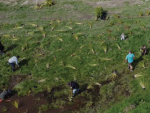The Ministry for Primary Industries (MPI) will be visiting packhouses and other horticultural operations across the country from today.
Horticulture New Zealand (HortNZ) says that the visits are educational in nature, aiming to help the industry understand its obligations as an essential service and help with compliance to stop the spread of COVID-19, which is the Government’s chief objective.
HortNZ says MPI appreciates that the horticulture sector has responded positively to the Government’s requirements under Level 4.
MPI officials will visit singularly, may phone ahead and will be from various MPI services.
They will keep a two-metre distance, are aware of biosecurity issues and the visits will be short. MPI officials will be able to answer questions verbally and can email information too.
MPI has also undertaken measures to improve the registration process.
Once the process has been improved, those that have registered will receive confirmation and a registration number via email.
Organisations can register here: https://www.mpi.govt.nz/covid-19-essential-primary-sector-service-registration











